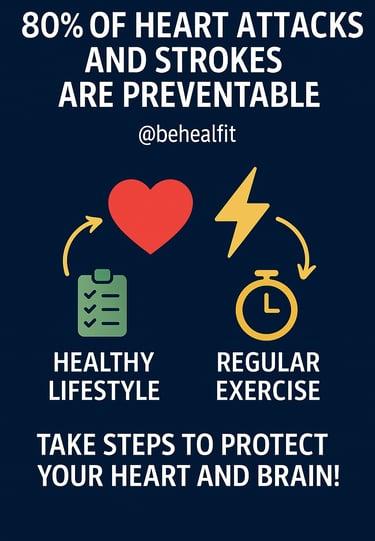80% of Heart Attacks and Strokes Are Preventable: Here’s How to Protect Your Heart
Discover how up to 80% of heart attacks and strokes can be prevented through lifestyle changes. Learn science-backed tips on diet, exercise, and prevention strategies to protect your heart and brain.
Narcisse Bosso
8/20/20253 min read


In Brief
Heart disease and stroke are the leading causes of death worldwide — yet research shows that up to 80% of these events are preventable with the right lifestyle habits. By adopting healthy choices in diet, exercise, and daily routines, you can significantly lower your risk and protect your cardiovascular system for years to come.
Table of Contents
Why Prevention Matters
The Link Between Lifestyle and Cardiovascular Health
Proven Ways to Prevent Heart Attacks and Strokes
Eat a Heart-Healthy Diet
Stay Physically Active
Manage Stress Effectively
Control Blood Pressure and Cholesterol
Avoid Smoking and Excessive Alcohol
Maintain a Healthy Weight
FAQ
Conclusion
Why Prevention Matters
According to the World Health Organization (WHO), cardiovascular diseases cause nearly 18 million deaths each year. But most of these deaths are linked to modifiable risk factors like smoking, poor diet, lack of exercise, and high blood pressure meaning they can be prevented.
The Link Between Lifestyle and Cardiovascular Health
Your daily habits have a direct impact on your heart and brain health. Research from the American Heart Association shows that people who follow a healthy lifestyle can cut their risk of heart attack or stroke by more than half.
For example, just 30 minutes of brisk walking or cycling daily can improve circulation, reduce blood pressure, and strengthen your heart muscle. (👉 Read also: Best Exercises for Your Heart).
Proven Ways to Prevent Heart Attacks and Strokes
1. Eat a Heart-Healthy Diet
Focus on fruits, vegetables, whole grains, lean protein, and omega-3 rich foods.
Limit processed foods, sugar, and trans fats.
Follow patterns like the Mediterranean diet, which has been shown to reduce cardiovascular risk.
2. Stay Physically Active
Aim for 150 minutes of moderate exercise per week.
Mix cardio (walking, cycling, swimming) with strength training to support overall cardiovascular health.
3. Manage Stress Effectively
Chronic stress raises cortisol and blood pressure. Incorporate stress-management techniques such as:
Deep breathing exercises
Meditation or yoga
Spending time in nature
4. Control Blood Pressure and Cholesterol
High blood pressure and cholesterol are silent killers.
Regular screenings and adopting a healthy lifestyle can help keep them in check.
👉 Learn more: How to Prevent Hypertension (High Blood Pressure).
5. Avoid Smoking and Excessive Alcohol
Smoking damages blood vessels and accelerates plaque buildup.
Limit alcohol to moderate levels — ideally no more than 1 drink per day for women and 2 for men.
6. Maintain a Healthy Weight
Excess weight, especially around the waist, increases the risk of heart disease and stroke. Pair a healthy diet with consistent exercise to achieve and maintain a healthy weight.
FAQ
1. Can heart disease really be prevented?
Yes. Studies show up to 80% of cardiovascular events are preventable with healthy lifestyle habits.
2. What is the best diet for heart health?
The Mediterranean diet, rich in vegetables, whole grains, fish, and olive oil, has strong evidence supporting its benefits.
3. How much exercise do I need for prevention?
At least 150 minutes of moderate-intensity exercise per week is recommended.
4. Do genetics play a role in heart disease?
Yes, but lifestyle choices significantly influence how genes are expressed and can greatly lower risk.
5. Can stress alone cause heart attacks?
While stress isn’t the only factor, chronic stress can contribute to high blood pressure and unhealthy coping habits that increase risk.
Conclusion
The majority of heart attacks and strokes are not inevitable. By focusing on prevention through diet, exercise, stress management, and avoiding harmful habits, you can dramatically reduce your risk and improve your quality of life.
💡 Action step: Choose one healthy habit like walking daily, cutting out processed foods, or practicing deep breathing and start today. Small changes add up to big protection for your heart and brain.
Scientific Sources
World Health Organization (WHO). Cardiovascular diseases (CVDs).
American Heart Association. Life’s Essential 8: Updating and Enhancing the Simple 7.
Estruch R, et al. Primary Prevention of Cardiovascular Disease with a Mediterranean Diet. NEJM, 2013.
Yusuf S, et al. Modifiable risk factors, cardiovascular disease, and mortality. The Lancet, 2020.
✍️ Written by: Narcisse Bosso, certified naturopath. His lifelong passion for health became a profound calling after a loved one passed away from a natural illness that could have been prevented with simple lifestyle changes and habits.
